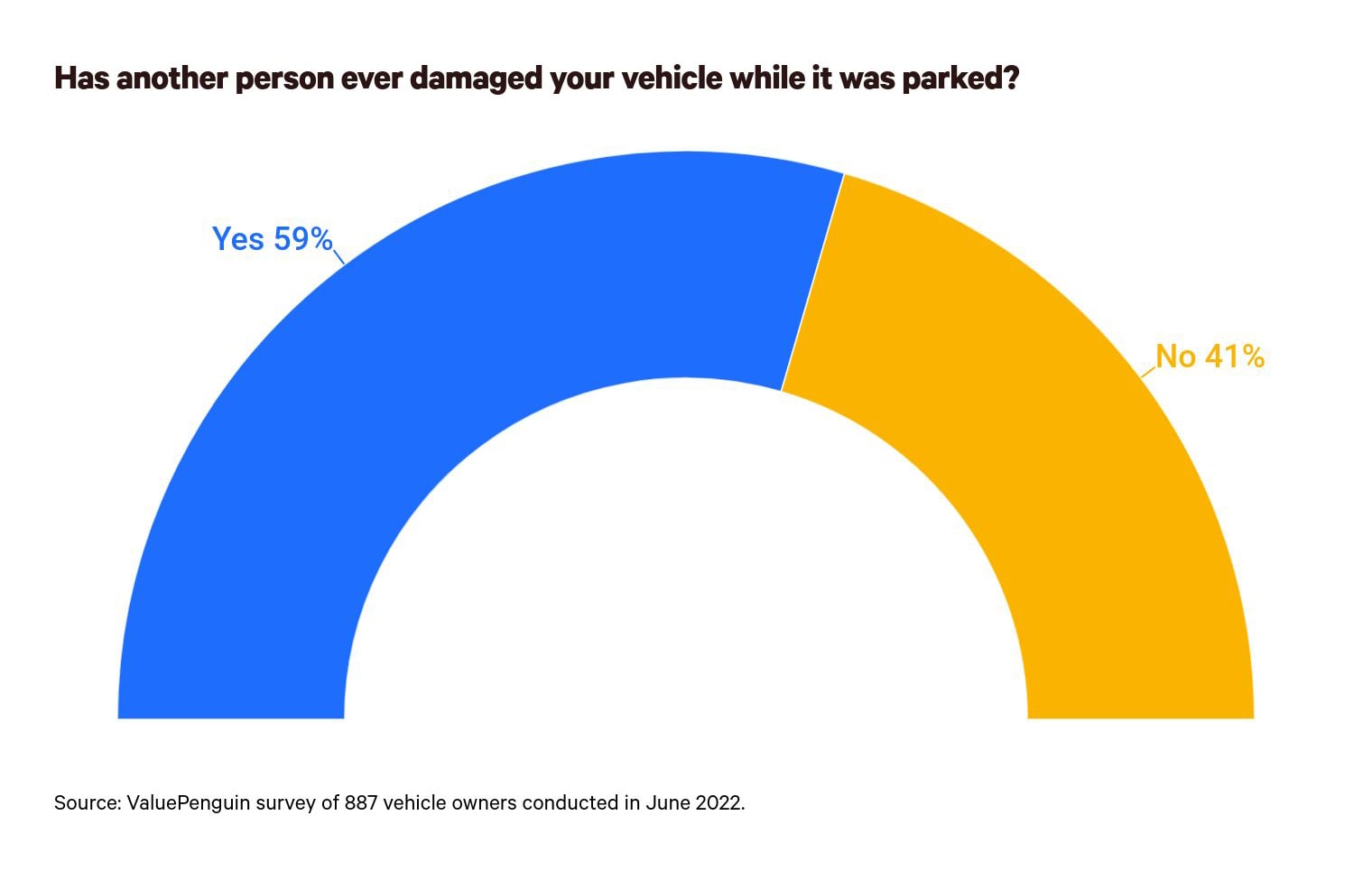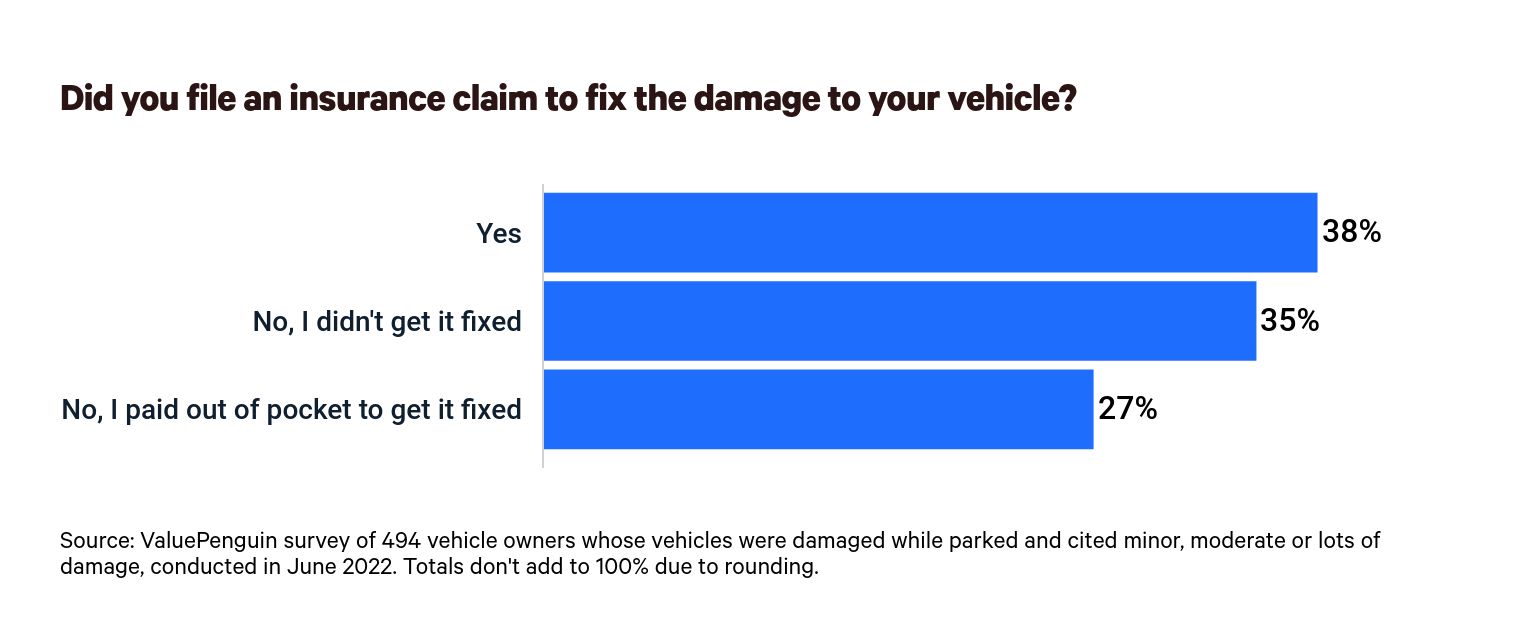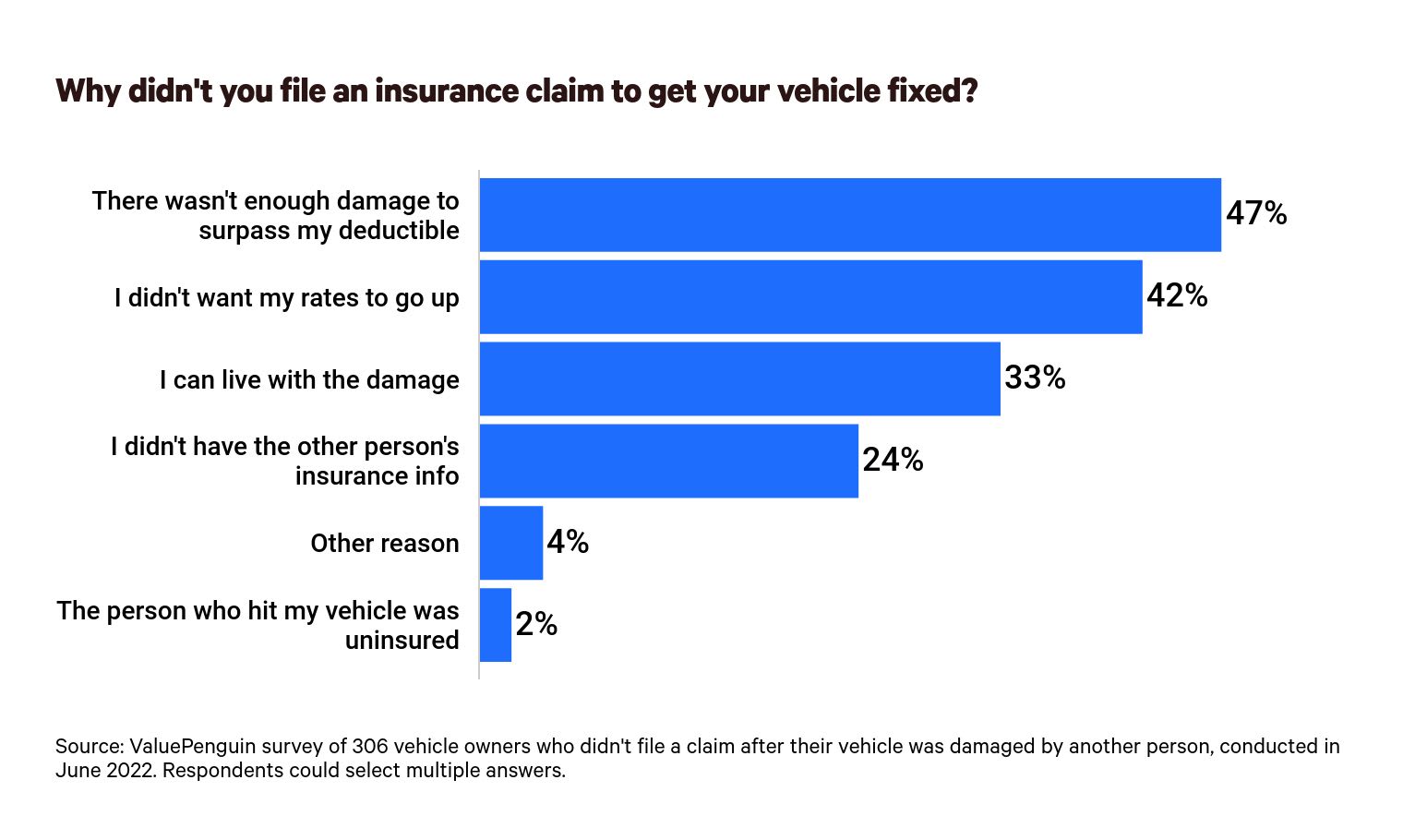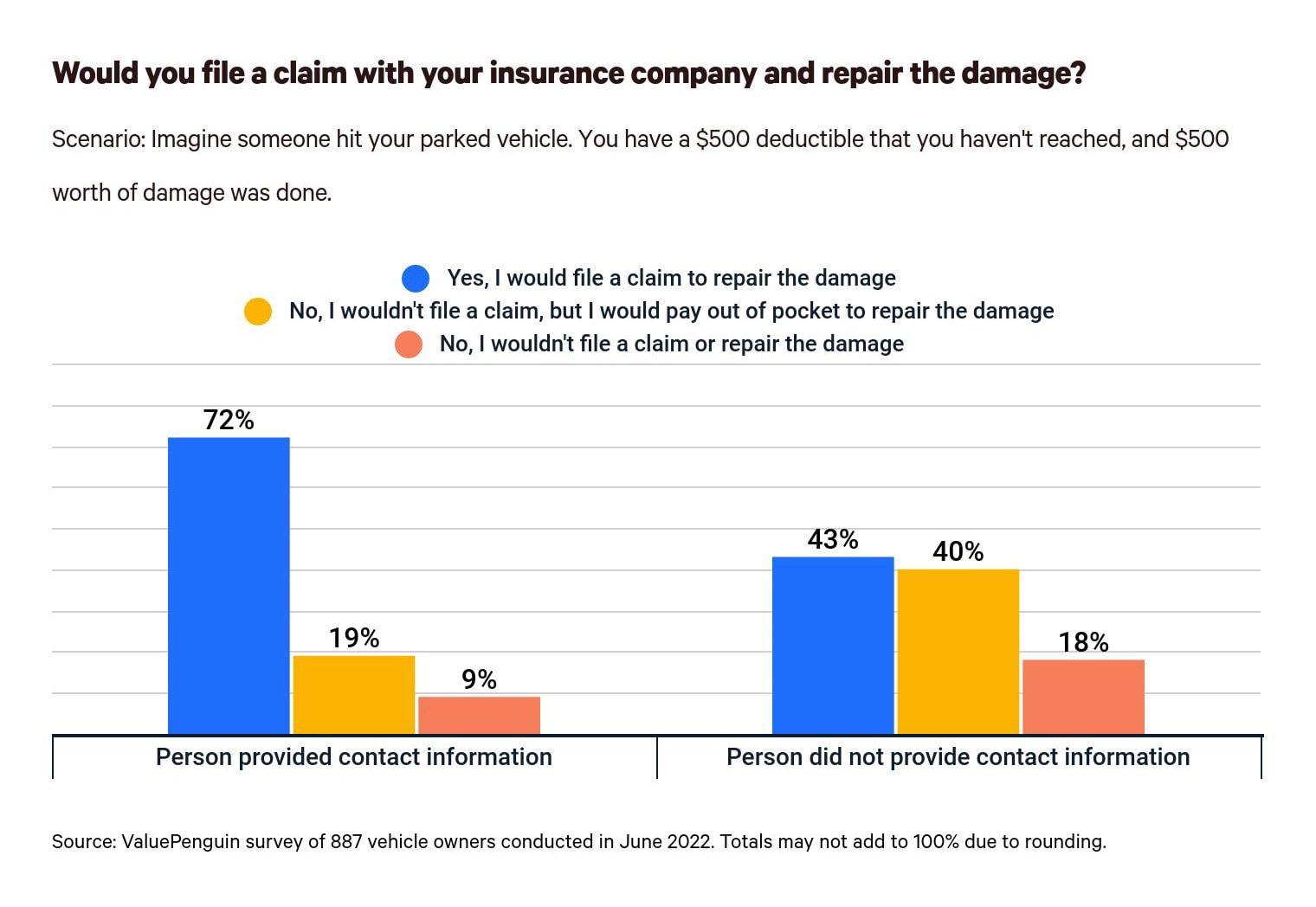Auto Insurance
Nearly 60% of Americans Say Another Person Has Damaged Their Parked Vehicle — Here’s What to Do If It Happens to You

Returning to your parked car and finding a new ding or scratch is an all-too-familiar experience for American drivers, and it may be more common than you think. According to the latest ValuePenguin survey, nearly 60% of vehicle owners say their cars have been damaged while parked. Of those, 70% say the other driver didn’t leave their contact information.
This survey asked nearly 900 car owners about their experience finding new damage on their parked cars, including how much damage their vehicles sustained and whether they filed an auto insurance claim.
- Key findings
- Majority of American car owners have sustained vehicle damage while parked
- Majority weren’t left notes, and 43% never found out who damaged their car
- 44% say their cars sustained large scrapes or dents, but was it worth fixing?
- Consumers more willing to involve insurance when they can contact the other driver
- If your parked car gets damaged, don’t skip the insurance claim
- Methodology
Key findings
- Nearly 60% of American vehicle owners say their vehicle has been damaged by another person while parked, most commonly by another car (44%) while parked in a garage or lot (66%). By region, Northeasterners (65%) are the most likely to report stationary vehicle damage, while those living in the West are the least likely (54%).
- Of those whose parked vehicle was damaged, most (70%) say the other person didn’t leave a note with contact information. Additionally, 43% never found out who did it.
- Most (44%) say a moderate amount of damage — such as a large scrape or dent — was done, but those with damaged vehicles were split when it came to getting it fixed. Of this group, 38% filed a claim with their insurance company, 27% paid out of pocket and 35% didn’t file a claim and chose not to get their vehicle fixed.
- Why not involve insurance? Those who didn’t file a claim cited two main reasons. They say there wasn’t enough damage to surpass the deductible (47%) and didn’t want their insurance rates to increase (42%).
- Consumers are more willing to involve insurance when they have the other driver’s information. 72% would file a claim to repair the damage if someone else damaged their vehicle and left a note, while only 43% would file a claim if they didn’t have the other driver’s information.
Majority of American car owners have sustained vehicle damage while parked
Overall, 59% of American car owners say another person has damaged their car while parked. Of those, 23% say it’s happened more than once.

Some factors may influence your likelihood of finding new damage on your parked car. Regionally, Northeasterners (65%) are the most likely to have had their cars damaged while parked, while Westerners are the least likely (54%). High earners are also more likely to experience parked car damage than low earners: 69% of those with annual household incomes of six figures or more have had their cars damaged while parked, versus just 51% of those with annual household incomes below $35,000.
Where you’re parked could also play a role. Of those who’ve experienced parked car damage, the majority (66%) occurred in a garage or lot. For baby boomers ages 57 to 76, that increases to 76%. Meanwhile, 32% happened while parked on the street and 12% while parked in a driveway.
When it comes to how the damage occurred, the majority (44%) report it was because another person’s vehicle hit theirs. The other ways consumers’ parked cars were damaged include:
- Another person hit their car door while opening their own (29%)
- Someone keyed their car (9%)
- Someone broke their windshield or windows (6%)
An additional 11% aren’t sure how the damage occurred, though Gen Zers ages 18 to 25 were the least likely to say this at just 2%.
23% of American drivers say they’ve damaged another person’s parked vehicle
Parked car damage is a two-way street, so American car owners aren’t entirely blameless. Overall, 23% of Americans have damaged someone else’s parked car — particularly Gen Zers (37%) and consumers with annual household incomes of $100,000 or more (34%).
Of these consumers, most say the damage occurred because they hit someone else’s vehicle with theirs (47%) or hit someone else’s car door while opening their own (36%). An additional 7% keyed someone else’s car and 1% broke someone else’s windshield or windows. They’re not just damaging other cars, though: 49% had damage to their own cars, too.
Majority weren’t left notes, and 43% never found out who damaged their car
If returning to a damaged car isn’t bad enough, car owners typically have to find the responsible party themselves — if they can find them at all. Of those whose parked cars were damaged, 70% say the other driver didn’t leave a note.

Baby boomers (88%), Midwesterners (85%) and those making less than $35,000 annually (79%) were the most likely to say the other driver didn’t leave a note with their contact information. Comparatively, 46% of Gen Zers say the other person left a note with contact information — highest among the demographics. They were also most likely to report being left a note without contact information at 24%.
With the majority having no way to contact the responsible driver, 43% never found out who damaged their cars. The groups least likely to be left notes with contact information are also the least likely to find the responsible party: 66% of baby boomers and 54% of Midwesterners never found out who damaged their cars. There’s a disparity between genders, too — 46% of men never found the responsible driver, compared with 39% of women. On the other hand, just 20% of Gen Zers say they didn’t know, followed by 27% of those making $100,000 or more.
Of those who found out who damaged their parked cars, 3 in 10 (31%) say it was a stranger. An additional 10% say a loved one was responsible for damaging their car. For millennials ages 26 to 41 and those making $100,000 or more, that likelihood increases to 20%.
33% of respondents who’ve hit a parked car didn’t leave their contact information — here’s why
While most drivers who’ve experienced stationary vehicle damage say the responsible party didn’t leave a note, those who’ve admitted to damaging a parked car report otherwise. Of this group, 67% say they did leave a note with their contact information.
Those who didn’t leave a note are most likely to say they didn’t leave a note because there wasn’t any damage (34%). The other common reasons for not leaving notes include:
- They didn’t want to get in any trouble (24%)
- They were embarrassed (21%)
- They thought they could get away with it (21%)
- They couldn’t afford to pay for the damage (10%)
The relationship between a driver and the owner of the car they damaged may play a role in their likelihood of leaving a note. Notably, more than half (51%) knew the owner of the car they damaged, with 20% reporting that it belonged to a loved one.
44% say their cars sustained large scrapes or dents, but was it worth fixing?
Of those whose vehicles were damaged while parked, most (44%) consumers’ cars were left with moderate damage, such as a large scrape or a dent. Following that, consumers were most likely to report:
- A minor amount of damage, such as a small scrape (37%)
- A major amount of damage, such as a large dent (14%)
- No visible damage (5%)
But those with damaged vehicles were split when getting them fixed. Just 38% of consumers whose vehicles were damaged while parked filed a claim with their insurance company. Of those who didn’t file a claim, 27% paid out of pocket and 35% chose not to get their vehicle fixed.

Northeasterners and Gen Zers were the most likely groups to file insurance claims, at 46% for both. Men (43%) were also more likely to file a claim than women (33%). Meanwhile, Midwesterners (49%) and baby boomers (45%) were the most likely to forgo repairs entirely.
Of those who do get their vehicles repaired, almost all demographic groups were more likely to go through insurance than pay out of pocket, but those making between $35,000 and $49,999 were an exception. Of those in this income bracket, 38% paid out of pocket for their repairs — 4 percentage points higher than those who went through insurance.
Deductibles are No. 1 reason for avoiding insurance claims
The reasons drivers didn’t involve their insurance vary. Overall, 47% of those who didn’t file an insurance claim say it’s because the damage wasn’t enough to meet their deductible. Baby boomers (66%) and those with annual household incomes of $100,000 or more (54%) were the most likely to say there wasn’t enough damage to meet their deductibles.

Following that, 42% say they didn’t involve insurance because they didn’t want their rates to go up, with men (48%) the most likely to do so. Southerners (47%) and those with household incomes of $50,000 to $74,999 (45%) were also more likely to cite insurance rates as the top reason.
Some drivers also say they didn’t involve insurance because they could live with the damage — particularly those with household incomes of $50,000 to $74,999 (46%), millennials (39%) and Midwesterners (37%). Meanwhile, 37% of Gen Zers said they didn’t involve their insurance because they didn’t have the other driver’s contact information, making it the top reason for this age group.
Consumers more willing to involve insurance when they can contact the other driver
Whether they’ve found new damage on a parked car before or not, consumers say obtaining the other driver’s contact information would largely influence their decision to involve insurance. If their vehicle was damaged at an amount equal to their deductible, 72% of respondents say they’d file a claim if the responsible driver left a note. Meanwhile, only 43% would file a claim if they didn’t have the other driver’s information.

Gen Zers and millennials are most likely to file a claim without the other driver’s contact information, at 54% for both. On the other hand, 67% of those making between $75,000 and $99,999 would file a claim even if they had the other driver’s contact information.
Still, most would fix the damage one way or another. Without the other driver’s information, 40% would still repair the damage by paying out of pocket. But even with the other driver’s contact information, some consumers still favor paying out of pocket for repairs — nearly 2 in 10 (19%) would pay out of pocket rather than file a claim. This is particularly true for consumers making between $75,000 and $99,999 (25%).
If your parked car gets damaged, don’t skip the insurance claim
Despite what consumers have done — or what they say they’d do — is it ever a good idea to skip the insurance claim? Not according to ValuePenguin auto insurance expert Divya Sangameshwar. Regardless of whether the other driver left a note, Sangameshwar says filing an insurance claim is the best move.
For those concerned about their insurance rates, Sangameshwar says there’s nothing to worry about.
"Your rates won’t increase if you are the driver who is not at fault," Sangameshwar says. "Choosing to pay out of pocket for damages, even if this exceeds your deductible, doesn’t make sense."
While you should follow the steps to document and report damages to their parked car, Sangameshwar emphasizes that you shouldn’t hesitate to report damages to your parked car. If you fail to do so in a timely manner, you run the risk of paying out of pocket for repairs.
Methodology
ValuePenguin commissioned Qualtrics to conduct an online survey of 887 U.S. vehicle owners, fielded June 17-20, 2022. The survey was administered using a nonprobability-based sample, and quotas were used to ensure the sample base represented the overall population. All responses were reviewed by researchers for quality control.
We defined generations as the following ages in 2022:
- Generation Z: 18 to 25
- Millennial: 26 to 41
- Generation X: 42 to 56
- Baby boomer: 57 to 76
While the survey also included consumers from the silent generation (those 77 and older), the sample size was too small to include findings related to that group in the generational breakdowns.